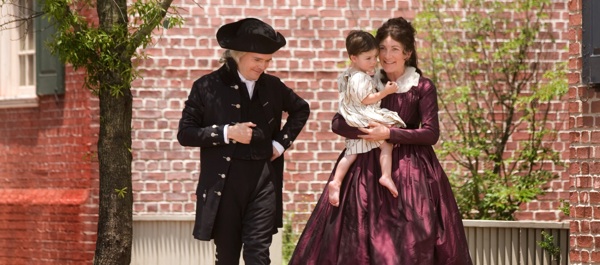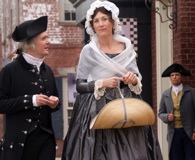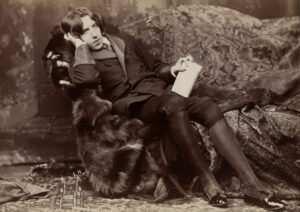
“She is the only permanent power in Washington. All of us are transient.”
She may not have been as eloquent as Abigail Adams, but Dolley Madison, America’s fourth First Lady, gets her own chance to shine March 1 in the American Experience series on PBS. The 90-minute program, which airs at 9:00 pm Eastern TIme, is based on the writings of Dolley and is interspersed with quotations from her and her famous and less-than-famous-contemporaries. Cokie Roberts and a host of historians narrate this fascinating story of the woman who helped create the culture of Washington, D.C., and of the young United States of America.
Dolley grew up in the school of colonial hard knocks. The family struggled after her Quaker father went bankrupt, a consequence of his freeing his slaves and relocating the family from North Carolina to Philadelphia where he attempted to set up a business. Dolley lost her husband, John Todd, Jr., and her youngest son to yellow fever when she was still in her early twenties.
This installation of the American Experience series shows us the playful yet grounded side of Dolley Madison, long renowned as a gracious hostess and the woman who invented the role of First Lady. (Editor’s note: The term “First Lady” had not yet come into use during the time of James Madison’s administration but since has come to be applied to the wife of any president, past or present, or to the chief hostess in the White House if the president is unmarried. See the National First Ladies Library.)
We watch her wistfully thinking of love as she giddily recounts stories of her numerous Quaker girlfriends marrying outside the church or (gasp!) even eloping. Dolley herself had no shortage of suitors, and we admire her even more as we are told that despite the many men who hoped to woo her after her first husband’s death, she chose the political genius, father of the Constitution and Federalist Papers, future Secretary of State, and future President of the United States, the bookish James Madison, for her husband.
 The Madisons were proof that opposites attract. Dolley was, in the immortal words of one of the narrators, “a babe,” and James was a short man with a very serious side (and 17 years her senior). The American people can consider themselves lucky that this pair had such a strong influence in shaping the character of the recently formed United States of America.
The Madisons were proof that opposites attract. Dolley was, in the immortal words of one of the narrators, “a babe,” and James was a short man with a very serious side (and 17 years her senior). The American people can consider themselves lucky that this pair had such a strong influence in shaping the character of the recently formed United States of America.
The theme of this special is that Dolley Madison’s highly evolved emotional intelligence made her remarkable. When her husband James became President in 1809, Dolley set about furnishing the newly completed White House. She knew to stay away from anything smacking of royalty, and instead chose more playful styles. With end tables, velvet curtains, and Greek-inspired designs she set the tone of what the recently formed office of the presidency should reflect: egalitarianism, optimism, and pragmatism. She knew that the White House was a symbol of executive power and that royal purple and gold-plated furniture would send members of Congress and the American people the wrong message. One more thing: every piece of furniture she commissioned was made in America.
Dolley’s abilities as a hostess in her newly furnished White House were legendary. For the inaugural ball she wore pearls, the American jewel, and she worked the room in her signature style, making everyone feel welcome and at home. In an effort to bring together sparring members of Congress (an unfortunate staple of American politics), Dolley would host weekly parties, where she even invited the American public. (Can you imagine having cocktails with a senator and not having to pay $1,000 a plate? Me neither.)
Furniture, parties, and a colorful wardrobe—is this really the stuff of history?
Yes, it is. Dolley was her husband’s most enthusiastic supporter and complemented his political genius by creating a welcoming space for members of the newly formed republic. She smoothed over diplomatic missteps, calmed tensions between warring members of Congress, and made everyone—from the farmers to the merchants to the members of the military—feel like equal, important parts of the young nation.
When the young nation engaged in the War of 1812 with Britain, Dolley proved herself a quick thinker and saved Gilbert Stuart’s famous portrait of George Washington (you’ve seen this portrait on the one-dollar bills in your pocket) from being looted, burned, or worse by the British. Even though the Brits were mere minutes away from charging upon the White House, Dolley took special care to pull the picture out of its frame (for ease of transport), rolled it up, and kept it safe for posterity.
Dolley outlived her husband and confidante by many years, and struggled financially because of her profligate son from her first marriage, John Payne Todd. But she returned to Washington, D.C., from her home in Montpelier and became the matriarch, the woman who reminded America, as it slowly slid into civil war, of its earlier greatness.
Congress made her an honorary member, and her trademark turban was seen around town as she met with political leaders and their wives. She became the grande dame of Washington.
Her lasting legacy is perhaps best summed up by a quote from one of her contemporaries, Senator Daniel Webster, at the end of the program: “She is the only permanent power in Washington. All of us are transient.”




